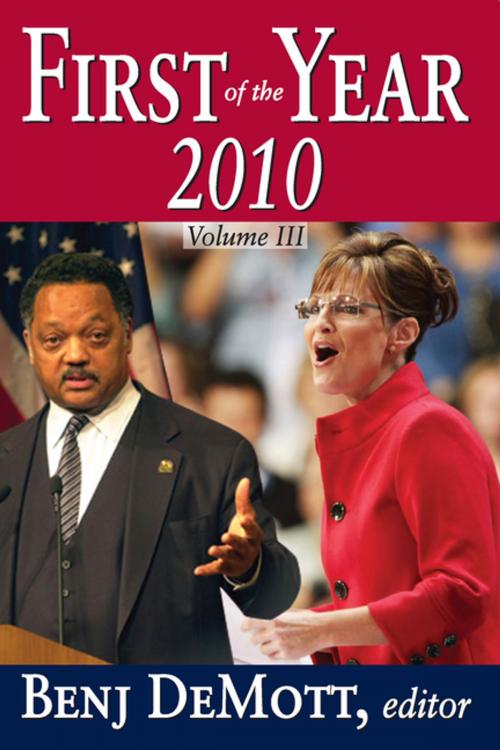First of the Year: 2010
Volume III
Fiction & Literature, Anthologies, Nonfiction, Social & Cultural Studies, Political Science| Author: | ISBN: | 9781351519694 | |
| Publisher: | Taylor and Francis | Publication: | July 5, 2017 |
| Imprint: | Routledge | Language: | English |
| Author: | |
| ISBN: | 9781351519694 |
| Publisher: | Taylor and Francis |
| Publication: | July 5, 2017 |
| Imprint: | Routledge |
| Language: | English |
This is the third volume of the First of the Year annual series. Contributors such as Armond White, Philip Levine, Charles O'Brien, Uri Avnery, Donna Gaines, Tom Smucker, Scott Spencer, and Amiri Baraka are back (and fractious as ever). And First's family of writers keeps growing. This volume includes vital new voices such as A. B. Spellman, Bernard Avishai, Rudolph Wurlitzer, and Diane di Prima.First never shies away from hot button issues Fredric Smoler, for example, offers a definitive consideration of America's recent history with torture. But First's approach to current political firestorms is often marked by a cool sense of the past. History is always in the mix when First writers examine the roots of Glenn Beck and Sarah Palin and contemporary right-wing pundits who falsely claim the mantle of Whittaker Chambers. First's refusal to toe "correct" lines is apparent in Benj DeMott's reconsideration of Chambers' work.The new volume is also marked by its cultivation of radical imaginations. The ideas of the Situationists and Cornelius Castoriadis are revived. A young historian, David Waldstreicher, recovers the radical, useable past in the 60s work of Staughton Lynd. Amiri Baraka evokes the felt quality of Jesse Jackson's 1988 campaign and another poet remembers (in verse) long-forgotten, extreme political acts of American Renaissance poets.A recent review of First of the Year: 2009 used a phrase of Kenneth Burke's "perspective by incongruity" to make sense of the method that shaped it. First is committed to thought-provoking incongruities. Faith that wonder is our best teacher informs this volume. First's music writing provides a high-low soundtrack of surprise. Beyond the section on Michael Jackson, there are serious responses to John Coltrane and Bach, World Saxophone Quartet and Mariah Carey, Sonny Rollins and Willie Mitchell. First's message is in
This is the third volume of the First of the Year annual series. Contributors such as Armond White, Philip Levine, Charles O'Brien, Uri Avnery, Donna Gaines, Tom Smucker, Scott Spencer, and Amiri Baraka are back (and fractious as ever). And First's family of writers keeps growing. This volume includes vital new voices such as A. B. Spellman, Bernard Avishai, Rudolph Wurlitzer, and Diane di Prima.First never shies away from hot button issues Fredric Smoler, for example, offers a definitive consideration of America's recent history with torture. But First's approach to current political firestorms is often marked by a cool sense of the past. History is always in the mix when First writers examine the roots of Glenn Beck and Sarah Palin and contemporary right-wing pundits who falsely claim the mantle of Whittaker Chambers. First's refusal to toe "correct" lines is apparent in Benj DeMott's reconsideration of Chambers' work.The new volume is also marked by its cultivation of radical imaginations. The ideas of the Situationists and Cornelius Castoriadis are revived. A young historian, David Waldstreicher, recovers the radical, useable past in the 60s work of Staughton Lynd. Amiri Baraka evokes the felt quality of Jesse Jackson's 1988 campaign and another poet remembers (in verse) long-forgotten, extreme political acts of American Renaissance poets.A recent review of First of the Year: 2009 used a phrase of Kenneth Burke's "perspective by incongruity" to make sense of the method that shaped it. First is committed to thought-provoking incongruities. Faith that wonder is our best teacher informs this volume. First's music writing provides a high-low soundtrack of surprise. Beyond the section on Michael Jackson, there are serious responses to John Coltrane and Bach, World Saxophone Quartet and Mariah Carey, Sonny Rollins and Willie Mitchell. First's message is in















